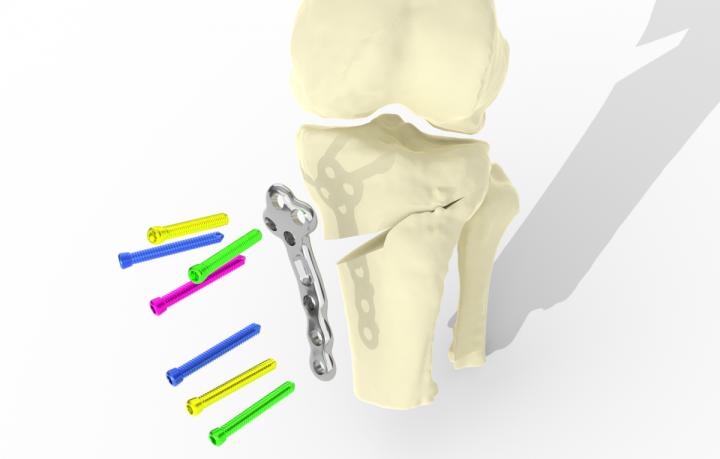
Credit: University of Bath
Pioneering ‘printed metal’ procedure to create bespoke treatment for early knee osteoarthritis set to be trialled in the UK following MHRA approval.
- World’s first 3D printed high tibial osteotomy (HTO) device and procedure developed at University of Bath given approval for UK trials
- Bespoke titanium alloy HTO implants that fit perfectly are designed to reduce discomfort for knee osteoarthritis patients
- Sophisticated 3D scanning aims to make surgery quicker and safer
- New TOKA process could make earlier intervention possible – saving patients decades of pain before surgery becomes viable
Intro
A groundbreaking new treatment that uses 3D printed implants and that could bring relief to tens of thousands of knee osteoarthritis sufferers has received approval to be trialled in UK patients, following a virtual “in-silico” trial that demonstrated its safety.
The personalised early knee osteoarthritis treatment, developed by engineers at the University of Bath’s Centre for Therapeutic Innovation (CTI), uses state of the art 3D metal printing technology to make personalised medical-grade titanium-alloy plates that perfectly fit every patient.
The TOKA (Tailored Osteotomy for Knee Alignment) treatment improves the operative procedure and fit of high-tibial osteotomy (HTO) plates used to realign a patient’s knee, making them more stable, comfortable and better able to bear weight than existing generic plates. The technique also simplifies HTO surgery, making operations quicker and therefore safer.
The HTO plates have already been safety tested virtually, in a computer-based trial using CT scan data from 28 patients. The in-silico clinical trial, the first in the world to demonstrate the safety of an orthopaedic device, modelled the stresses that would be exerted on the bespoke plates and showed that they would be comparable in safety to the standard treatment.
Professor Richie Gill, from the Centre for Therapeutic Innovation, says: “Knee osteoarthritis is a major health, social and economic issue and does not receive as much attention as it should. A quarter of women over 45 have it, and about 15 percent of men, so it’s a significant burden that many live with.
“Knee replacement is only useful for end-stage osteoarthritis, so you can be in pain and have to live with a disability for a long time, potentially decades, before it’s possible. We hope that the new TOKA process we’ve developed will change that.”
Knee osteoarthritis patients undergoing TOKA will undergo a 3D CT scan of their knee, before a personalised 3D printed surgical guide and plate, both shaped to their tibia (shin) bone is created. The surgical guide simplifies the surgery, and is designed to improve surgical accuracy.
The process also sees the first implementation of 3D printed screw threads into the HTO plates, meaning they can be optimally positioned to help secure them against the bone.
Trials to begin once clinical centres reopen for elective surgery
When clinical centres return to carrying out elective surgery, expected later this year, the trials will begin. Hospitals in Bath, Bristol, Exeter and Cardiff will take part in a randomised control trial to compare patient outcomes with an existing generic HTO procedure.
Tests of the TOKA technique have already begun in Italy, where so far 25 patients received new personalised HTO plates as part of a trial at the Rizzoli Institute in Bologna.
High Tibial Osteotomy (HTO) surgery realigns the knee joint by making a cut to the tibia (shin bone) and opening a small gap, which needs to be stabilised by a metal plate. This realignment moves the loading to a less ‘worn’ part of the knee. Patient outcomes depend on how accurately the cut is made and the gap opened.
Prof Gill adds: “The HTO surgery has a long clinical history and it has very good results if done accurately. The difficulty surgeons have is achieving high accuracy, which is why we have created the TOKA method, which starts with a CT scan and digital plan.
“3D printing the custom knee implant and doing the scanning before operating means surgeons will know exactly what they’ll see before operating and where the implant will go.”
“In addition to a surgeon being able to precisely plan an operation, a surgical guide (or jig) and a plate implant, each personalised to the patient, can be 3D printed automatically based on the scanning data.
“Importantly this type of treatment relieves the symptoms of knee osteoarthritis while preserving the natural joint.”
The pre-planning element greatly simplifies surgery and could cut the time on the operating table from two hours to around 30 minutes.
The work to date and UK trial is supported and funded by Versus Arthritis. The in silico trial has been published in Communications Medicine.
###
Media Contact
Vicky Just
[email protected]
Original Source
https:/
Related Journal Article
http://dx.




